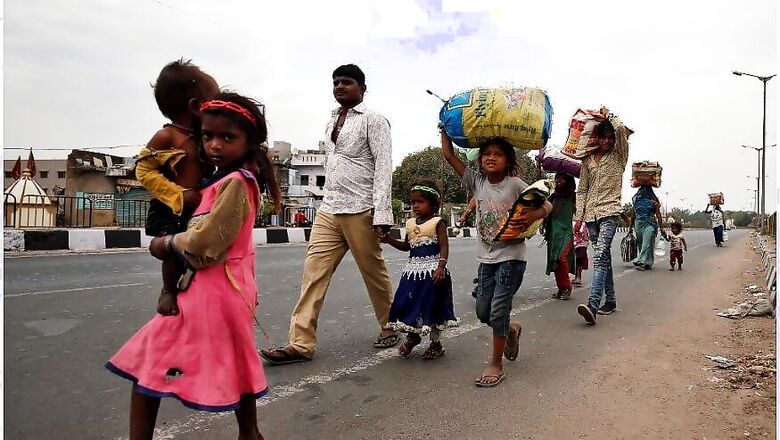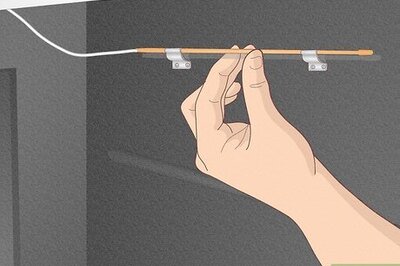
views
"Is sheher mein wo koi baraat ho ya vardaat, ab kisi bhi baat par khulti nahi hain khidkiyaan" (Be it a marriage procession or a tragic incident, windows in this city do not open for anything) - Dushyant Kumar.
Life, rather death, came a wretched, full circle for 15 migrant workers in Madhya Pradesh on Saturday. A special train carried their remains back home. Unavailability of this very train had forced them to sleep on railway tracks where they were mowed down by a freight carrier. But India has long moved on.
A day after the accident, the country's top Twitter trend said #MeTooMigrant. What started as a way of standing together with workers in the Covid-19 lockdown, was soon hijacked by the privileged. Most used the hashtag to narrate how they had to leave their home towns for high paying jobs and education in colleges where migrants are given the task of sweeping floors and cleaning toilets.
Poet-lyricist Abdul Hayee, popularly known by his pen name Sahir Ludhianvi talked about this stark difference in India's class system in 1964 when he wrote:
"Ye duniya do rangi hai,
Ek taraf se resham odhe, ek taraf se nangi hai,
Ek taraf andhi daulat ki paagal aish parasti,
Ek taraf jismoñ ki qeemat roti se bhi sasti,
Ek taraf hai Sonaagaachi, ek taraf Chaurangi hai,
Ye duniya do rangi hai"
(This world is double-faced,
One side covered with silk, the other naked,
On the one hand, the hedonism of blind wealth,
On the other, bodies sold cheaper than bread,
On the one hand lies Sonagachi, on the other Chowringee15,
This world is double-faced.)
One wouldn't be surprised if not even one labourer used the trend to voice his or her concerns. How would they? A section of them are busy returning home after a 40-day-battle with hunger, joblessness, deplorable living conditions and a forced separation from family. The rest are still cooped up inside hostile camps — all in the midst of a global pandemic after the Centre imposed a sudden lockdown, leaving millions stranded.
Parallel to this, there is another India. One that comprises of the same lot that had joined the bandwagon last day to recount their 'sorrowful' tales of migration. City-dwellers conveniently forgot the very people who build their homes, lay their roads and clean their sewage. A legitimate excuse, they were toiling hard in romanticising the quarantine. Newly prepared dishes, buzz cuts, dance routines and everyday-changing social media trends have kept them rather occupied. The reporter writing this story also belongs to the group who enjoy abundance.
Revolutionary poet Athar Husain Rizvi better known as Kaifi Azmi, Bollywood actor Shabana Azmi's father, captured the sentiment of how workers are left to rot in the dirt after their job is done in his poem ‘Makan’. He wrote about builders of a palace having to sleep in the dust, guarded out of their own creation.
"Ban gaya qasr to pahre pe koi baith gaya, so rahe ḳhaak pe ham shorish-e-tamir liye"
(After the palace was built, someone was appointed to guard it while we slept in the dust amid the bustle of construction)
Urdu writer Haidar Ali Jafri from Uttar Pradesh's Balrampur also has a perfect reminder for India's upper class in the form of his couplet.
"Khoon mazdoor ka milta jo na ta-ameeron mein, na haveli na mehel na koi ghar hota"
(If a labourer's blood was not mixed with the rich, there would have been no mansions, palaces and homes)
However, it was again Sahir in 1964 who called out the rich for their innate tendencies to use and throw. Taj Mahal might be synonymous with love, but for him, it mirrored exploitation.
"Taj tere liye ek mazhar-e ulfat hi sahi,
Tujh ko is vaadi-e rangeeñ se aqeedat hi sahi,
Meri mahboob, kahiñ aur mila kar mujh se..."
(For you, the Taj may be the expression of love,
And you might be enamoured by its beautiful setting,
But my love, meet me elsewhere ...)
"Meri mahboob, unheñ bhi to mohabbat hogi ,
Jin ki sannaa’i ne bakhshi hai ise shakl-e jameel,
Un ke pyaaroñ ke maqaabir rahe be naam-o numood,
Aaj tak un pe jalaayi na kisi ne qandeel"
(My beloved, they too must have loved passionately,
They, whose craft has gifted this monument its beautiful visage,
Their loved ones lie in unmarked graves,
Dark, forgotten, unvisited.)
On the other hand, it will be wrong to assume that India's haves do not care at all. They do as much as their token empathy allows them. On March 22, a large proportion of the population came out for clapping and thaali-banging, supposedly in solidarity with doctors and health workers. Later, the same professionals were ostracised, attacked and thrown out of rented apartments by the very soldiers of unity.
Two weeks later, all lights inside houses were switched off at 9pm for 9 minutes. Millions stood at their balconies with diyas, candles and flash lights to express the same peppercorn sentiment.
However, workers and labourers were still missing from the narrative.
"Hone do charaghan mehlon mein, kya hum ko agar diwali hai,
Mazdoor hain hum, mazdoor hain hum, mazdoor ki duniya kaali hai…
(Let there be light in palaces, what have we got to do even if there's Diwali,
We are labourers, we are labourers, our worlds are always dark)
Daulat ki seva karte hain thukrae hue ham daulat ke,
Mazdur hain hum, mazdoor hain hum sautele bete qismat ke"
(We work for the rich and are kept away from money,
We are labourers, we are labourers, we are abandoned step-sons of good fortune)
Urdu writer, Meer Kazim Ali famous as Jameel Mazhari born in Bihar's Motihari portrayed how whatever happens in these abundant households, the life of a labourer will always be grim, in his poem ‘Mazdoor ki bansuri’ (A labourer's flute).
The formal sector constitutes of merely 8 per cent of the entire work force. The remaining 92 per cent is the informal sector where many toil in the twilight zone for a pittance. It is surprising that the dependent Indian middle class still does not give due importance to its workers given the lockdown removed all forms of help it receives from them. Probably the security of having domestic helps, milkmen, drivers, washer men and others back became apathy's crutch.
"Gareebi bohot zaruri hai,
Taaki ghar humare saaf rahein,farsh humare chamchamate,
Gareebi bohot zaruri hai,
Taaki bartan humare dhule chamakte rahein aur kapde safed,
Gareebi bohot zaruri hai,
Ki sandaas se humaare na aaye bas, aur kitchen se uthti rahein khushbuyein aur swaas,
Gareebi bohot zaruri hai,
Taaki bacche humaare nehlaaye, dhulaaye aur damakte rahein aur muh humaare jooton mein dikhte rahein,
Gareebi bohot zaruri hai"
(Poverty is very important,
So that our houses are clean and floors shining,
Poverty is very important,
So that our utensils are shiny clean and our clothes white,
Poverty is very important,
So that our toilets don't stink and our kitchens smell of perfume,
Poverty is very important
So that our children are bathed and clean and our shoes are polished to reflect our faces,
Poverty is very important)
Actor, screen-writer Atul Tiwari wrote this after 500 slums were demolished in an anti-encroachment drive conducted by the Indian Railways in Delhi's Shakur Basti on November 12, 2017. In the process, a six-month-old girl had died due to shock and injuries on chest and head due to impact of blunt force.
Meanwhile, it will be naive to assume that poverty arising out of migration has nothing to do with caste. According to the 64th round of the National Sample Survey, 22 per cent of the migrants are from OBC households and 19.3 per cent belong to scheduled castes and scheduled tribes. This includes the skilled workforce. Experts believe that almost all unskilled and semi-skilled migrants belong to backward castes.
"Chulha mitti ka,
Mitti Talaab ki,
Talaab Thakur ka"
(The stove is made out of mud,
The mud is sourced from the lake,
The lake belongs to the upper-caste landlord)
"Bhukh roti ki,
Roti bajre ki,
Bajra khet ka,
Khet thakur ka"
((We have) a hunger for bread,
Bread made of pearl millet,
Pearl millet grown in the fields,
The field belongs to the upper-caste landlord)
"Bail Thakur ka,
Hal Thakur ka,
Hal ki mooth par hatheli apni,
Fasal thakur ka"
(The bull belongs to the upper-caste landlord,
The plough belongs to the upper-caste landlord,
The hands on the shaft of the plough are ours,
The harvest belongs to the upper-caste landlord)
"Kuan Thakur ka,
Pani Thakur ka,
Khet-khalihan Thakur ke,
Galli-muhalle Thakur ke,
Phir apna kya?
Gaon?
Shehar?
Desh?"
(The well belongs to the upper-caste landlord,
The water belongs to the upper-caste landlord,
The crops and the fields belong to the upper-caste landlord,
The lanes that run through these neighbourhoods belong to the upper-caste landlord,
Then what is ours?
The village?
The city?
The nation?)
Om Prakash Valmiki, one of the most celebrated contemporary Dalit writer and poet wrote this scathing account on caste-based division labour in his poem "Thakur ka kuan" (Thakur's well).
Back in the present, News18 reported on how impatience is growing in camps where workers have not been able to return home. Added to this, now state governments have come up labour law dilutions that make work hours longer, lessen medical assistance and give industries the free-will to make labourers work in unregulated environments. Patience, even for the most oppressed, does come with an upper limit.
The anger against those who oppress the workers is evident in a large number of poems written by progressive Urdu writers, as in Viqar Ambalavi’s ‘Inteqaam’ (Revenge).
"Khaayein bhi mazdoor ka, mazdoor par ghurrayein bhi,
Din ko mehnat bhi karayein, raat ko rulvayein bhi,
Bhook se mazdoor ke bachche bhi bilkein maa-ein bhi,
Tuf hai saramaaya paraston par kahin mit jayein bhi,
Inteqaam, ai inteqaam, ai inteqaam, ai inteqaam"
(Not satisfied with appropriating the workers’ share, you growl at them too,
Not enough that you make them slave during the day, you make them weep at night too,
Not only do the workers’ children wail with hunger, their mothers cry too,
Damn you, O capitalism-lovers, may you perish,
Revenge, revenge, revenge, revenge)
During the time this article was being written, five migrant labourers were killed and 13 injured when a truck in which they were travelling in from Uttar Pradesh to Hyderabad turned turtle in Madhya Pradesh's Narsinghpur district. Rest assured, India's bourgeois will soon move on or may never come to know by the time they sleep off their Sunday insomnia.
"Bhookh hai toh sabr kar, roti nahi toh kya hua,
Aajkal Dilli mein hai zer-e-behes ye mudda"
(If you are hungry, be patient, so what if you have no bread?
These days hunger is a hot topic of debate in the Delhi Durbar)
These lines by one of the most quoted poet, Dushyant Kumar, are part of the same poem with which the story began. "Bhookh hai toh sabr kar" (If you are hungry, stay patient) was written in 1975 when times were not very different when compared to today.




















Comments
0 comment